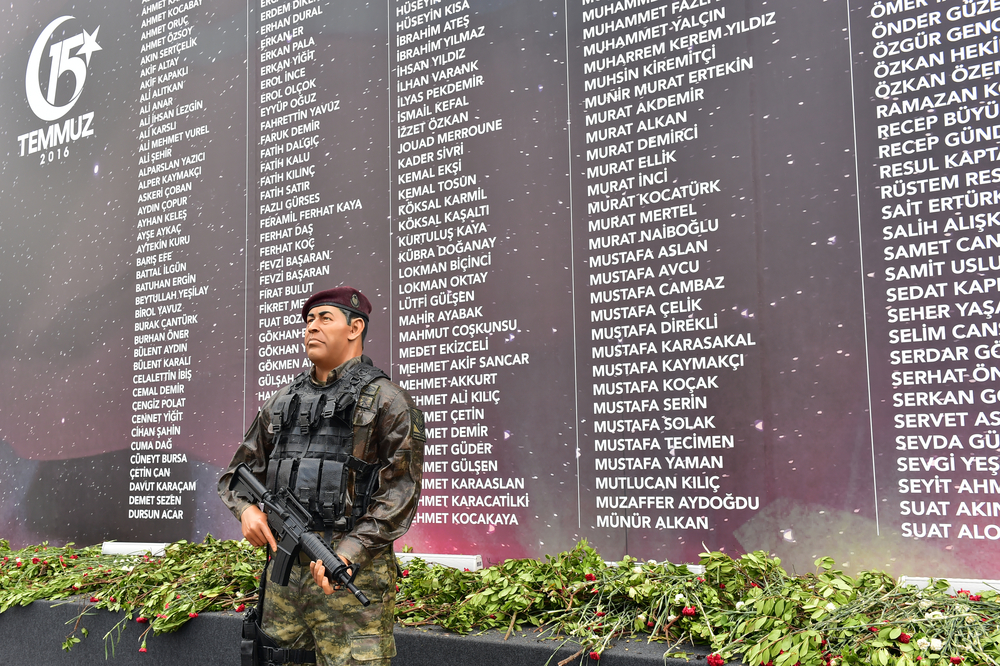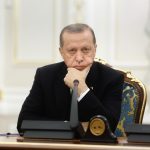by Giorgio Cafiero
Since the Ottoman era, the people of Anatolia have experienced military interventions in politics that have dramatically impacted the lives of millions. Arguably, the first such coup occurred in 1876, with Sultan Abdulaziz’s ouster. Following the establishment of the Republic of Turkey, four coups—three “traditional” (1960, 1971, and 1980) and one “post-modern” (1997)—have interrupted Turkey’s transition from one-party rule (1925-1945) to democracy, which commenced at the end of World War II when Turkey aligned with the Western bloc against the Soviet Union.
Turkey’s military justified the twentieth-century coups under the banner of protecting the ideology of Mustafa Kemal Atatürk, known as Kemalism. The coupists’ language always stressed defending Turkey from anti-secularism, Communism, turmoil, anarchy, and other threats to what the putschists defined as modern civilization.
The latest attempted military intervention in Turkish politics took place on July 15, 2016. The plotters presented their intentions as being in line with Kemalism. The pro-junta personnel, however, were linked, according to officials in Ankara, to the Fethullah Gulen Terrorist Organization (FETO).
Led by Fethullah Gulen, an Islamic cleric who has been living in Pennsylvania in self-exile since 1999, the Gulen movement practices “civil Islamic” traditions, which emphasize spirituality, economic growth, ethics, interfaith dialogue, and social justice. Members of this movement consider themselves “apolitical” as Gonul Tol explains. When Turkey’s secular military closely controlled the country’s political environment, it oppressed both the Gulen movement and the predecessors of the ruling Justice and Development Party (AKP). The Gulen movement and the AKP worked together after the latter’s ascension to power in 2002 to weaken military tutelage. Yet the Gulen-AKP alliance came to an end once the ruling party began seeing Gulen’s community as a threat, especially after an incident in December 2013 when prosecutors, allegedly linked to the Gulen movement, charged AKP officials and their family members with corruption. Soon after, the AKP began accusing the movement of seeking to establish a “parallel state” in Turkey with the objective of removing the AKP from power. According to Turkish government officials, FETO’s members had actually begun infiltrating Turkey’s military decades ago.
Yet the coupists failed to achieve their goals in 2016 for numerous reasons. A primary factor was that, although putschists in the traditional coups and the post-modern one had a degree of legitimacy in the eyes of many Turks, there was no popular support in 2016 for such a military intervention in Turkey’s political arena. The plotters’ use of violence against unarmed civilians two years ago, which contrasted with the threatened (but not unleashed) violence of the twentieth-century coups, led many Turks, including political opponents of the AKP, to rally behind President Recep Tayyip Erdogan and demand that the US extradite Gulen to Turkey to face a judge.
Regardless of the reasons behind the government’s triumph, the turmoil of July 15, 2016 significantly changed Turkey, both internally and externally. Since that coup attempt, Turkish authorities have arrested tens of thousands of Turks, mainly in the country’s media, military, educational system, public sector, and civil society organizations, based on their alleged FETO affiliations. The roughly 250 Turks who sacrificed their lives in the anti-coup resistance are glorified today. The renaming of the Bosphorus Bridge to “July 15 Martyrs’ Bridge” and the upcoming inauguration of the “July 15 Martyrs’ Monument” in front of the presidential palace in Ankara embody such veneration.
Fingers Pointed at Washington
Turkish discourse has grown increasingly anti-American over the past two years. To be sure, prior to the 2016 plot, there was significant opposition to the US in Turkey due to the American-led invasion and subsequent occupation of Iraq, the “Hood Incident of 2003,” and, most recently, Washington’s support for the Kurdistan Workers’ Party-affiliated People’s Protection Units (YPG) in Syria. The commonly accepted narrative in Turkey that Washington had a hand in the events of July 15, 2016 has also increased friction in the Turkey-US strategic alliance.
The official US response to the coup plot fueled significant anger in Turkey. The Turkish leadership viewed Washington’s support for the country’s government as ambiguous, insufficient, and unprincipled. The first official response from the US government came from then-Secretary of State John Kerry, who called for “stability and peace and continuity in Turkey.” Although Kerry affirmed America’s “absolute support for Turkey’s democratically elected civilian government and democratic institutions,” many Turks took such words to be disingenuous.
First, Kerry never used the word “coup.” Second, the White House released another statement soon after that called on “all parties” to “act within the rule of law.” This caution from Washington fueled a Turkish perception that the US administration had given a degree of legitimacy to the putschists. Similar language came from the Obama administration after the Egyptian coup of 2013, which largely informed this Turkish perspective three years later. Ultimately, the White House appeared to be hedging its bets with a wait-and-see approach, expressing firm support for Erdogan’s government only after it was abundantly clear that the coup plotters had failed, instead of during the hours of uncertainty.
Turkish suspicions of American involvement in the plot were fueled by the fact that Turkish fighter jets, which bombed civilians in urban areas during the attempted coup, took off from Incirlik, America’s military base in Adana. Turks in high-policy circles and on the streets as well wonder how these fighter jets could have flown out of the base without the US military knowing.
The reaction of the major media outlets in the US and other Western countries also fueled much anger. A tweet from The New York Times read, “Those who took to the streets in Turkey were mostly yelling religious slogans in support of Erdogan, not democracy itself.” This reaction offended those who believed that the anti-coup resistance was about saving Turkey from a return to military rule, rather than promoting Islamism. The pro-putschist commentary of Fox News added insult to injury. Particularly outrageous was former CIA officer Robert Baer’s assertion on Anderson Cooper’s CNN show that the coup plot was “not professionally done” and that the putschists “should have taken CNN Turk and closed it down [during] the first minutes, the radio station, social media, the internet. Even if they didn’t arrest Erdogan, they should have taken care of all of that right at the beginning.”
The AKP’s struggle to civilianize Turkish politics has been hard fought. Turkish politicians who have spent their careers fearing that they could meet the same fate as former Prime Minister Adan Menderes—executed after the 1960 coup—have high stakes in thwarting a military takeover. Equally, many Turkish citizens, including the AKP’s supporters and critics, who recall the oppression that followed the 1980 coup, have a vested interest in preventing the military from, again, ousting civilian leaders. That such diverse segments of Turkish society resisted the coup plotters in 2016 received little media attention in the West.
Turkey’s Role in a World of Coups
“Turkey is not Panama.” Mehmet Bakaroglu, vice president of the Islamist Saadet Party, uttered these words in response to the George W. Bush administration’s negative reaction to the Turkish parliament’s vote against granting the US territory and airspace for the 2003 invasion of Iraq. Bakaroglu sought to distinguish Turkey from Latin American “banana republics.” Fifteen years after his comment, such rhetoric still speaks to many Turks who would like their government to assert its own sovereignty more strongly and demand that Washington treat Turkey not as a subservient state but rather as a rising power.
For Turkey, July 15, 2016 is not only a watershed date on a par with the founding of the Republic of Turkey almost 95 years ago. It also marks a major triumph over forces of Western imperialism from Ankara’s perspective, much like the 2002 failed coup attempt against Venezuela’s populist government.
A sensitive issue in Turkey was the Egyptian coup of 2013, which ousted the pro-Turkish/pro-AKP Muslim Brotherhood president, Mohammed Morsi. Now, with the Trump administration strongly supporting Egypt’s current regime and the three Arab Persian Gulf states blockading Qatar (Turkey’s closest Arab ally), Ankara perceives Washington as having backed Arab powers that have directly or tacitly supported such interventions in both Turkey and Qatar. In the immediate aftermath of the failed 2016 coup, Egypt opposed a UN Security Council statement that called on parties to “respect the democratically elected government of Turkey,” which was unsurprising given how President Abdel Fatah al-Sisi came to power. Nonetheless, Turkey saw this move as part of a united front of counter-revolutionary Arab forces and their Western allies. Two years after the plot, the AKP-ruled government believes that it stands on the “right side of history” for its opposition to twenty-first-century coups in the Middle East and serves as a model for Muslim countries that seek to civilianize their politics and keep the military forces in the barracks.
The events of July 15, 2016 did not end the Turkey-US strategic alliance. That said, unanswered questions about Washington’s alleged role in the coup attempt, the Obama administration’s response, and mainstream US media coverage have all increased anti-Americanism in Turkish discourse. As Turks talk about ending a centuries-long era of coups and institutionalizing the civilianization of their political system, the perception that the US and other Western and Arab countries are collectively hindering such efforts represents a serious challenge for the two NATO allies’ bilateral relationship.
This friction is underscored by the Turkish government’s detention of US citizen Andrew Brunson. This pastor from North Carolina has been held in Turkey since 2016 on charges of terrorism and espionage. Such accusations stem in part from Brunson’s ownership of books about Kurdish history, his meeting with an Amnesty International lawyer (also later arrested for alleged FETO ties), and “secret witnesses” who accused the pastor of seeking to establish a Christian Kurdish state in Turkey while working with the YPG and FETO.
Borrowing a page from the North Korean and Iranian regimes’ playbooks and, in flagrant violation of international law, Turkey is holding American citizens as political hostages to put pressure on the US government to extradite Fethullah Gulen. Turkey is playing an unhealthy game that significantly contributes to the erosion of trust between Ankara and Washington. At this juncture, two years after the failed coup, restoring trust will be essential for this strategic alliance to move forward, especially as Turkey pursues a highly ambitious foreign policy in the Middle East and Africa where support from the US will be crucial.






On the other side of the ledger, Erdogan has burnt the bridges to the
European Union. Wise Turks will regret it.
Erdogan didn’t burn his bridges to the EU. These were blown up after the SDP lost in a landslide to Merkel in 2005, as the CSU part of her coalition ideologically refuses to allow Turkey full membership. Erdogan, realising this, continues to play the game of wanting access, because this is necessary for maintained Turkey’s Western credentials, in turn necessary to attract capital, but he isn’t holding his breath. Meanwhile, rejection by the EU and the fractious relations with Western politicians in general plays into his hands. Erdogan’s numerous electoral successes are due directly to his vilification at the hands of Western commentators.